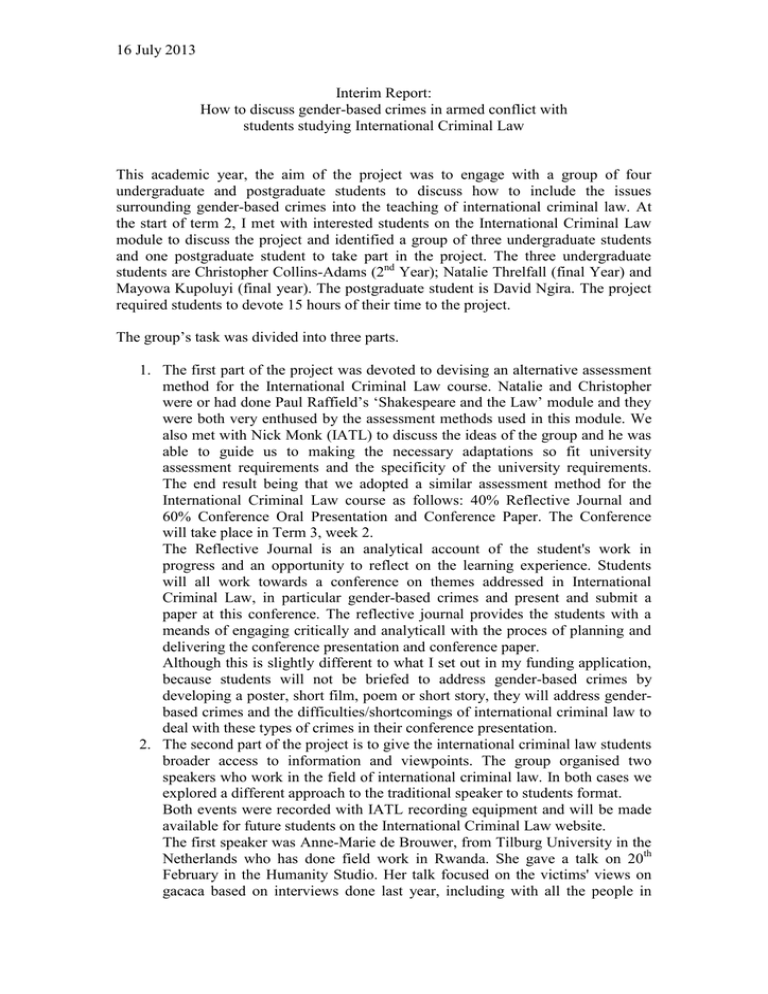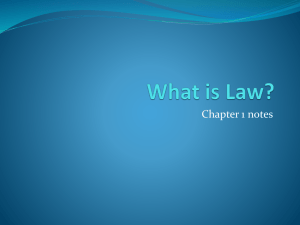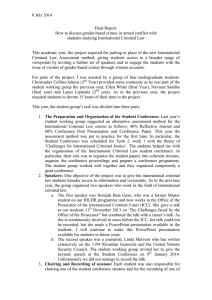16 July 2013 Interim Report: students studying International Criminal Law
advertisement

16 July 2013 Interim Report: How to discuss gender-based crimes in armed conflict with students studying International Criminal Law This academic year, the aim of the project was to engage with a group of four undergraduate and postgraduate students to discuss how to include the issues surrounding gender-based crimes into the teaching of international criminal law. At the start of term 2, I met with interested students on the International Criminal Law module to discuss the project and identified a group of three undergraduate students and one postgraduate student to take part in the project. The three undergraduate students are Christopher Collins-Adams (2nd Year); Natalie Threlfall (final Year) and Mayowa Kupoluyi (final year). The postgraduate student is David Ngira. The project required students to devote 15 hours of their time to the project. The group’s task was divided into three parts. 1. The first part of the project was devoted to devising an alternative assessment method for the International Criminal Law course. Natalie and Christopher were or had done Paul Raffield’s ‘Shakespeare and the Law’ module and they were both very enthused by the assessment methods used in this module. We also met with Nick Monk (IATL) to discuss the ideas of the group and he was able to guide us to making the necessary adaptations so fit university assessment requirements and the specificity of the university requirements. The end result being that we adopted a similar assessment method for the International Criminal Law course as follows: 40% Reflective Journal and 60% Conference Oral Presentation and Conference Paper. The Conference will take place in Term 3, week 2. The Reflective Journal is an analytical account of the student's work in progress and an opportunity to reflect on the learning experience. Students will all work towards a conference on themes addressed in International Criminal Law, in particular gender-based crimes and present and submit a paper at this conference. The reflective journal provides the students with a meands of engaging critically and analyticall with the proces of planning and delivering the conference presentation and conference paper. Although this is slightly different to what I set out in my funding application, because students will not be briefed to address gender-based crimes by developing a poster, short film, poem or short story, they will address genderbased crimes and the difficulties/shortcomings of international criminal law to deal with these types of crimes in their conference presentation. 2. The second part of the project is to give the international criminal law students broader access to information and viewpoints. The group organised two speakers who work in the field of international criminal law. In both cases we explored a different approach to the traditional speaker to students format. Both events were recorded with IATL recording equipment and will be made available for future students on the International Criminal Law website. The first speaker was Anne-Marie de Brouwer, from Tilburg University in the Netherlands who has done field work in Rwanda. She gave a talk on 20th February in the Humanity Studio. Her talk focused on the victims' views on gacaca based on interviews done last year, including with all the people in 16 July 2013 "The Men Who Killed Me", see http://www.dmpibooks.com/book/the-menwho-killed-me/excerpt". We used the informality of the Humanity Studio to have students just sit around like Rwandans would do in Gacaca courts. The second speaker was Messeh Leone who has been doing work with War Child on 15th May in L2. Messeh was affected by the war and shared his experiences about his work with children affected by war in Sierra Leone and other countries across the world, in particular his programme United Sierra Leone Initiative, helping people and communities recovering from conflict and the unification of children used and abused in conflict . His talk centered around the use of ‘Child Soldier’ and the debate around that. We gave the students a brief to engage with Messeh with a question/answer session. 3. The third part of the project involved the researching and recording of witness accounts of gender-based crimes to use as the basis of the first seminar in international criminal law. At the end of term 3 we finalised the material and borrowed one of IATL Marantz recorders to record these witness accounts using the voices of my group of students. Over the summer I will edit these to make a 15 minutes recording the use next academic year. I have enjoyed working with this group of students as they were very pro-active and had some really good ideas. I look forward to using the material with next year’s students and identifying a new group of students to work with to invite some more speakers. Solange Mouthaan






